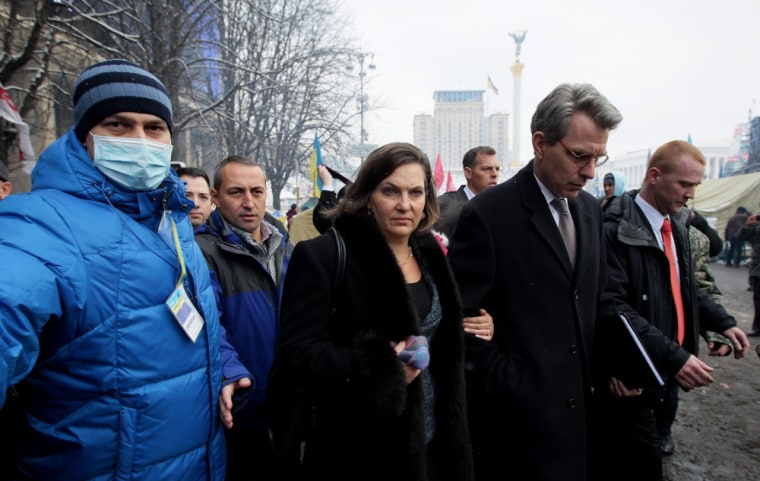
Assistant Secretary of State Victoria Nuland told Ukraine's president early Wednesday that police action against encamped protesters calling for his resignation was "absolutely impermissible in a democratic society."
Nuland met with President Viktor Yanukovich in Kiev, where thousands of protesters have been occupying Independence Square.
"I made it absolutely clear to him that what happened last night, what has been happening in security terms here is absolutely impermissible in a European state, in a democratic state," she told reporters after the meeting.
They are demonstrating against his decision to back away from a pact that would deepen Ukraine's economic ties with the 28-nation European Union and push it back towards Russia's sphere of influence.
Nuland had earlier spoken to opposition leaders in the square where the protests began in late November. She added that she believed it was still possible to save Ukraine's European future but it was up to Yanukovich to lead the way.
Hundreds of police in riot gear worked to clear the streets around the camp overnight, where thousands of protesters remained despite sub-zero temperatures.
As they dismantled barricades and pushed demonstrators, some fought back and scuffles broke out between police and opposition lawmakers who arrived to defend the camp.
Officers also surrounded the City Hall where protesters have set up makeshift hospital in the occupied building and sprayed protesters with water cannons to prevent them storming the building.
"I made it absolutely clear to him that what happened [Tuesday] night ... is absolutely impermissible in a European state and in a democratic state," Nuland said, describing talks with Yanukovich as "tough" but "realistic."
By Wednesday morning, police appeared to scale back and protesters began to rebuild some of the barricades that had been destroyed.
Interior Minister Vitaliy Zakharchenko said in a statement that police had received numerous complaints from residents living near Independence Square in the central part of the city about inability to travel to their homes and the lack of peace at night, but he maintained that a peaceful solution would be sought.
“I want to reassure everyone that there will be no dispersal,” he said. “No one infringes on citizens' right of peaceful protest, but we cannot ignore the rights and legitimate interests of others.”
On Wednesday afternoon, U.S. State Department spokeswoman Jen Psaki said, "We believe there is still a way forward for Ukraine, that it is still possible to save Ukraine's European future. We want to see President Yanukovych lead his country back onto that path, and that this is a pivotal moment to either meet the aspirations or disappoint the voices of the people."
The protests began in late November when Yanukovych backed away from a pact that would deepen the former Soviet republic's economic ties with the 28-nation EU — a pact that surveys showed was supported by nearly half the country's people.
"It is the stupidest thing that he could have done," world heavyweight boxing champion turned opposition politician Vitaly Klitschko told Reuters on Tuesday. "There are laws of physics: the more pressure, the more resistance. I am sure there will be a huge number of Ukrainians here in a few hours."
Ukraine's dire economic straits have also been a factor in its political crisis. The country of 46 million people has been in recession for more than a year, and the government is in desperate need of foreign funding to avoid a default.
Moscow has worked to derail the deal with the EU and lure Kiev into its own economic group by offering price discounts and loans as well as imposing painful trade restrictions.
The crisis has divided Ukraine's 46 million people between its mainly Russian-speaking East, where many view Moscow as a source of stability, and its West, where mostly Ukrainian-speakers tend to prefer integration into the European mainstream.
Reuters and The Associated Press contributed to this report.
Related: